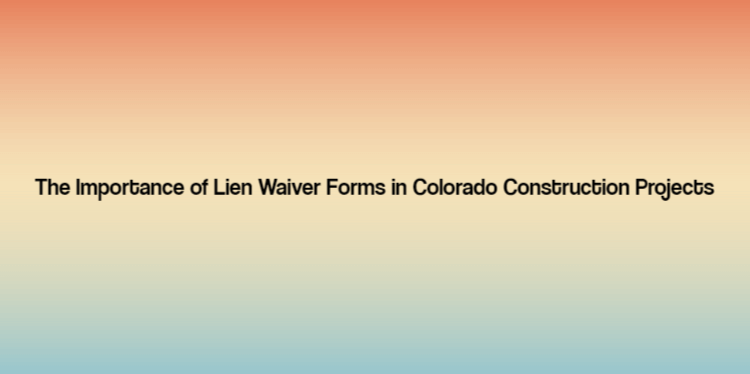Page Contents
The Importance of Lien Waiver Forms in Colorado Construction Projects
Construction projects involve complex legal and financial transactions. Contractors, subcontractors, suppliers, and other parties involved in a construction project need to ensure that they receive payment for their work and materials. At the same time, property owners and general contractors need to protect themselves from liens filed by unpaid parties. One of the tools used to address these concerns is the lien waiver form.

A lien waiver form is a legal document that waives a party’s right to file a lien against a property for non-payment. It is typically used in exchange for a progress or final payment in a construction project. By signing a lien waiver form, a party acknowledges that they have received payment for work done or materials provided and that they will not file a lien against the property.
Why is a Lien Waiver Form Important in Colorado Construction Projects?
Lien waiver forms are particularly important in Colorado construction projects because of the state’s lien laws. Colorado has a unique statutory scheme for construction liens that requires strict compliance with specific deadlines and notice requirements. Failure to comply with these requirements can result in the loss of lien rights.
One of the most notable aspects of Colorado’s lien laws is the concept of “subordination by agreement.” This means that a party can waive its lien rights in advance by signing a lien waiver form. If a party signs a lien waiver form without receiving payment, they risk losing their lien rights altogether.
In addition to protecting lien rights, lien waiver forms can also help to facilitate payments in a construction project. By signing a lien waiver form, a party acknowledges that they have received payment and can move forward with the project without delay or disputes.
Different Types of Lien Waiver Forms and Their Uses
There are four main types of lien waiver form Colorado construction projects:
Conditional Waiver and Release Upon Progress Payment
This type of waiver is used when a party has completed work or provided materials for a portion of the project and is receiving a progress payment. It waives the party’s right to file a lien for the amount of the progress payment but does not waive their lien rights for the entire project.
Unconditional Waiver and Release Upon Progress Payment
This type of waiver is similar to the conditional waiver and release but is unconditional, meaning that it waives the party’s lien rights for the entire amount of the progress payment.
Conditional Waiver and Release Upon Final Payment
This type of waiver is used when a party has completed all work or provided all materials for the project and is receiving final payment. It waives the party’s lien rights for the entire project but only upon receipt of the final payment.
Unconditional Waiver and Release Upon Final Payment
This type of waiver is similar to the conditional waiver and release but is unconditional and waives the party’s lien rights for the entire project upon receipt of final payment.
The Legal Requirements for a Lien Waiver Form in Colorado
In Colorado, lien waiver forms must comply with specific legal requirements to be valid. These requirements include:
- The form must be in writing and signed by the person waiving lien rights.
- The form must identify the property or project for which the waiver is being given.
- The form must state the amount of payment received or to be received.
- The form must include a description of the work done or materials provided.
It is important to note that lien waiver forms cannot waive lien rights for work or materials not yet provided or for amounts not yet paid. Additionally, parties cannot be required to sign a lien waiver form as a condition of receiving payment.
The Consequences of Not Using Lien Waiver Forms in Colorado
The consequences of not using lien waiver forms in Colorado can be significant. Parties who do not use lien waiver forms risk losing their lien rights altogether or facing disputes and delays in the project.
If a party files a lien against a property and it is determined that they signed a lien waiver form, the lien may be deemed invalid. This could result in the loss of lien rights and the inability to collect payment for work done or materials provided.
Additionally, disputes over payments and liens can delay a project and increase costs. By using lien waiver forms, parties can avoid these disputes and ensure timely payments.
Comparison of Colorado and Wisconsin Lien Waiver Forms
While Colorado has strict requirements for lien waiver forms, other states may have different requirements or no requirements at all. For example, Wisconsin lien waiver form have differences..
However, Wisconsin courts have established common law requirements for lien waivers, including that they be clear and unambiguous and that parties cannot waive lien rights for work not yet performed or materials not yet provided. Wisconsin also recognizes the concept of “partial waivers,” which allows parties to waive lien rights for specific portions of the project.
It is important for parties involved in construction projects to understand the specific requirements for lien waivers in their state and to use appropriate forms to protect their rights and facilitate payments.
Conclusion
Lien waiver forms are an important tool for parties involved in construction projects to protect their rights and facilitate payments. In Colorado, strict compliance with legal requirements for lien waiver forms is necessary to ensure the validity of lien rights and avoid disputes and delays in the project. By understanding the different types of lien waiver forms and their uses, parties can ensure that they are using the appropriate forms for their needs. It is important for parties to consult with legal professionals to ensure compliance with state-specific requirements for lien waivers and to protect their interests in construction projects.